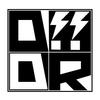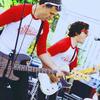DangerDeathRay3

Joined: Sep 24, 2019
Posts: 40
Hamilton, Ontario





|

Posted on Feb 25 2020 03:35 PM
Getting ready for summer, patios, and parks, we're working on developing an "unplugged" set.
My question is what to do with the bass? What do you other bass players do for low volume, portable sets? Have you found a loud enough acoustic bass guitar? Do you just turn your amp down low? Do you have a different, more portable amp? A bass amp that runs on batteries?
I'm looking to match the volume of a heavy-handed acoustic guitar player, and a drummer with brushes.
I would like to get an upright bass, but that's not in the cards right now.
Thanks!
— Danger!! Death Ray
Facebook
Instagram
YouTube
BandCamp
|
Redfeather

Joined: Jul 30, 2016
Posts: 896

|

Posted on Feb 25 2020 05:21 PM
Those acoustic basses, though tempting, are simply not loud enough to accompany other instruments like you're describing. I bought one planning to use it "around the campfire" but even just an acoustic guitar overwhelms it.
That said, they are still cool because, as I discovered, you can close mic them and get a sound that approximates an upright bass.
So I guess I should adjust my commentary and say that if you do go that route, it can work but you'll need to either plug it into an amp or mic it up and run that through an amp. Maybe a little Fender Rumble 40 or similar? I have an Acoustic B20 that I would call totally sufficient for that scenario.
|
Gilette

Joined: May 04, 2014
Posts: 734



|

Posted on Feb 26 2020 03:46 AM
-
Last edited: Mar 03, 2022 06:20:50
|
J_Durango

Joined: Oct 15, 2017
Posts: 91
Ulverston




|

Posted on Feb 26 2020 07:14 AM
I agree with what's already been said, acoustic basses aren't up to keeping up with other other instruments.
If you go down the small amp route, I can recommend the Roland Bass Micro Cube RX. It has enough volume to deal with "patio" sets, is super portable, and even has a Fender Bassman setting! They run on batteries or mains too. The added bonus for me is the Fender Bassman setting combined with the in built reverb makes it a great guitar practice amp too.
— The Spiratones - Instro/Surf from the rain-soaked north-northwest of England
|
edwardsand

Joined: Jun 29, 2018
Posts: 806
|

Posted on Feb 26 2020 07:35 AM
I had an acoustic bass for a while when living in England and I really liked the sound of it, but like everyone says, it's not very loud. However, to me the problem isn't being drowned out, as you can hear the notes being played (and I usually use a pick, which adds some volume and sharp attack to it) - it's that it doesn't produce much low end at all. You don't get much rumble or thump to it, so it fills out the sound less than an electric bass.
|
DangerDeathRay3

Joined: Sep 24, 2019
Posts: 40
Hamilton, Ontario





|

Posted on Feb 26 2020 08:46 AM
Thanks everyone. I think I'm going to proceed with a tiny battery powered amp and my small electric bass.
I had a fretless acoustic years ago. It had a great sound and tone, but very low volume. I always had it plugged in when playing with other musicians - even when everyone was acoustic.
I was very excited to learn about the Roland Micro Cube that runs on batteries, but it's been discontinued and people are asking hundreds of dollars for them on Amazon and eBay. I'll keep an eye open for a better price though.
I wish one of my preferred amp manufacturers made a battery powered bass amp, but nothing from the big names. I ordered one of these: https://www.amazon.ca/gp/product/B07RXYC3YM/ref=ppx_yo_dt_b_asin_title_o00_s00?ie=UTF8&psc=1
Hopefully it works for me and I don't have to return it. I'm not expecting killer tone or bass, but it should do the job for patio parties.
— Danger!! Death Ray
Facebook
Instagram
YouTube
BandCamp
|
SabedLeepski

Joined: Jul 18, 2018
Posts: 128
Tilburg







|

Posted on Feb 26 2020 11:19 AM
I played upright bass before I switched to bass guitar and remember when we played the streets once with a previous band (bass + 2 Spanish guitars). The bass just completely disappeared. That was until we found a spot in front of a closed shop that had a wedge shaped porch in their shopping window (not sure if that makes sense in English). When I positioned me and my bass in that porch it reflected all the bass tones in one direction, which made a big difference.
I've heard stories from the times when bands all played without amplification and where bass players made sure to be the first on stage to pick the best spot. This could be where either walls would reflect their sound best or where some beam within the stage itself would pick up the tones from the bass pin and use the whole stage itself as a sound box.
Anyway, a battery driven amp is probably a good choice ;)
— Surfin’ Europe – Surf gigs in Europe
The Malbehavers – Instrumental Surf Music from Tilburg (NL)
Tout Tilburg Surft – Malbehavers’ debut EP
|
montereyjack66

Joined: Jul 23, 2014
Posts: 646
LA -ish






|

Posted on Feb 26 2020 01:07 PM
I have a Jasmine acoustic which sounds good and can work along side most acoustic six strings. It can also be plugged in and sounds VERY cool. I also have a Guitarrone which is a bit louder and boomier but may prove confusing for some as the lowest note is an open A. You get used to it quickly enough. You can use a battery guitar amp but you need to dial back the lows a bit. There are LOTS of small bass amps by major manufacturers that sound good but still require AC. AN extension cord and a multi plug adapter can be your friend. Good luck!
— mj
bent playing for benter results
Do not attempt to adjust your TV set.
https://www.facebook.com/Bass-VI-Explorers-Club-179437279151035/
https://www.facebook.com/Lost-Planet-Shamen-366987463657230/

|
dp

Joined: Feb 26, 2006
Posts: 3546
mojave desert, california





|

Posted on Feb 27 2020 09:38 PM
I use the Kala U-Bass (Ukulele bass tuned E A D G) and a Roland battery powered bass amp for remote "acoustic" gigs. Sounds great.
KALA U-Bass
Last edited: Mar 01, 2020 11:48:21
|
DeathTide

Joined: Apr 13, 2018
Posts: 1382
New Orleans






|

Posted on Feb 28 2020 07:55 AM
How about a washtub bass on a resonant riser? Pretty cheap at least haha!
— Daniel Deathtide
|
Surfing_Sam_61

Joined: Jan 15, 2019
Posts: 1515
|

Posted on Feb 28 2020 07:22 PM
DeathTide wrote:
How about a washtub bass on a resonant riser? Pretty cheap at least haha!
 Skiffle Style. Skiffle Style.
Yeah electric bass is the way, Just turn it down/
A Danelectro horn bass serves both worlds very well for a reasonable price. The trick is to use a Flanging pedal, all the old surf records flanged the bass channel. They actually had a guy sitting near a tape recorder plugged into the bass channel mixer and mic plugged into the tape machine. He would push his thumb on the flange of the tape to slow down the tape speed every few seconds to get the flanging effect.
Much easier with a pedal now.
I forgot to add, if you already own a six string acoustic guitar, you could try to get a octave pedal for it to play through a amp, all a bass really is a octave below the guitar notes anyway in the same position or fret on the neck. Just play the 6,5,4,3 strings (you can play all but thats 6 string bass style) They usually tune open 6 string to B and the 5 string to E etc the rest continue down in standard tuning 4A 3D 2G 1B so you can get that low B on the Open 6 string, of course you need to think of the 5 string as what is normally the top string with a 4 string bass.
The Octave pedal my be the cheapest route (can you borrow one or have it already?)
To be even more Surfy, the most used bass on recordings was 6 String
Danelectro bass (OK I could never find one, but there was Baritone guitar version, so I can only gather that's what was used, and tuned lower or differently to get the notes right?) I can't remember the studio players name but he worked on all of Terry Melcher's productions and used that Bass or Baritone guitar or what ever it was on thousands of recordings and many studios around LA in the 1960's. (Mainly Hot Rod type songs) Mainly because a lot of those songs used the Country and Western or Honky Tonk type bass lines playing 1, 1, 5, 7. 7, 5, 5 bass line progression or some variation of notes like that and could play the low 5 on turn arounds above the root note in F etc on a 6 string bass...seems like all those songs were in F or keys around there. But Melcher loved the bass sound it got on records.
Last edited: Feb 28, 2020 20:37:53
|
PolloGuitar

Joined: Feb 26, 2006
Posts: 5144
San Francisco











|

Posted on Feb 29 2020 12:41 AM
Surfing_Sam_61 wrote:
A Danelectro horn bass serves both worlds very well for a reasonable price. The trick is to use a Flanging pedal, all the old surf records flanged the bass channel. They actually had a guy sitting near a tape recorder plugged into the bass channel mixer and mic plugged into the tape machine. He would push his thumb on the flange of the tape to slow down the tape speed every few seconds to get the flanging effect.
??????? - Source?
How exactly do you slow down one instrument on a multi-track tape? It would slow down the entire tape, all tracks and all instruments.
— Buy Endless Drummer @ Bandcamp
Frankie and the Pool Boys website
Buy Speed of Dark @ Bandcamp
Pollo Del Mar website
My Blog- Euro Tour Blog
Pool Boys on Spotify
INSTAGRAM
Frankie & The Pool Boys on Facebook
Pollo Del Mar on Facebook
DJ Frankie Pool Boy on North Sea Surf Radio
|
Richard

Joined: Mar 02, 2006
Posts: 1683
Georgia





|

Posted on Feb 29 2020 07:36 AM
I wouldn't overthink it. Even a large solid state bass amp can be turned down and still sound good.
— The Mystery Men?
El Capitan and The Reluctant Sadists
SSS Agent #31
|
Surfing_Sam_61

Joined: Jan 15, 2019
Posts: 1515
|

Posted on Feb 29 2020 12:31 PM
PolloGuitar wrote:
Surfing_Sam_61 wrote:
??????? - Source?
How exactly do you slow down one instrument on a multi-track tape? It would slow down the entire tape, all tracks and all instruments.
Flanging was a common technique on bass in the late 50's . The tape delay machine was on one channel of a board and the dry signal on another - its only the bass effected by the technique and the tape machine was dedicated to the bass only (Pre-board)- everything else was recorded on a master tape machine. Most of the pedals available today were originally studio tricks by sound engineers back in the day. Back then they only had three track master recording, most backing tracks were performed live in the studio.
|
spskins

Joined: Feb 27, 2006
Posts: 3796
tn







|

Posted on Feb 29 2020 06:44 PM
Surfing_Sam_61 wrote:
PolloGuitar wrote:
Surfing_Sam_61 wrote:
??????? - Source?
How exactly do you slow down one instrument on a multi-track tape? It would slow down the entire tape, all tracks and all instruments.
Flanging was a common technique on bass in the late 50's . The tape delay machine was on one channel of a board and the dry signal on another - its only the bass effected by the technique and the tape machine was dedicated to the bass only (Pre-board)- everything else was recorded on a master tape machine. Most of the pedals available today were originally studio tricks by sound engineers back in the day. Back then they only had three track master recording, most backing tracks were performed live in the studio.
????? Source?
— http://www.satanspilgrims.com
http://www.facebook.com/pages/Satans-Pilgrims/8210228553
https://satanspilgrims.bandcamp.com/
http://www.surfyindustries.com
|
Surfing_Sam_61

Joined: Jan 15, 2019
Posts: 1515
|

Posted on Feb 29 2020 07:21 PM
spskins wrote:
????? Source?
https://en.wikipedia.org/wiki/Flanging
https://en.wikipedia.org/wiki/Delay_(audio_effect)
Les Paul invented the basic technique in 1948 in his garage but used homemade or recorded records instead of tape for making demos , the Tape Delay method came later when Bing Crosby gave him a German made tape machine as a gift, and used to make a sound on sound tape recorder-player etc in about 1951, and used in a big way in 1952 to 1954. By the late 1950's everybody used tape delay and flanging in studios.
A good example was Scotty Moore had a custom made amp with tape delay built right into the bottom of the speaker cabinet in 1956 for live Elvis shows. . Most surf bands only used this in the studio only but was used on all the records though.
Most Surf recordings used a combination of Room - Spring - Tape delay in various combinations depending on the group and studio used. Frank Zappa was a studio engineer and used this process on many Surf Bands in the early 60's
|
surferjoemusic

Joined: Jan 01, 2008
Posts: 2107
Livorno





|

Posted on Mar 01 2020 02:56 AM
Surfing_Sam_61 wrote:
spskins wrote:
????? Source?
https://en.wikipedia.org/wiki/Flanging
https://en.wikipedia.org/wiki/Delay_(audio_effect)
Les Paul invented the basic technique in 1948 in his garage but used homemade or recorded records instead of tape for making demos , the Tape Delay method came later when Bing Crosby gave him a German made tape machine as a gift, and used to make a sound on sound tape recorder-player etc in about 1951, and used in a big way in 1952 to 1954. By the late 1950's everybody used tape delay and flanging in studios.
A good example was Scotty Moore had a custom made amp with tape delay built right into the bottom of the speaker cabinet in 1956 for live Elvis shows. . Most surf bands only used this in the studio only but was used on all the records though.
Most Surf recordings used a combination of Room - Spring - Tape delay in various combinations depending on the group and studio used. Frank Zappa was a studio engineer and used this process on many Surf Bands in the early 60's
I’d be glad to meet you and discuss these things in front of machines and effect. probably even Ferenc Dobronyi would like to be present. I think personally this is all mostly wrong and misunderstood. Like saying that a Dano bass was the most used in surf (?!?). I am in California often, I was the whole February.
I also think that if you are absolutely sure of what you say, it seems so, you should have to provide concrete examples, sound samples, and show this all... because most of us don’t think the same but we may be all wrong.
— Lorenzo "Surfer Joe" Valdambrini
(www.surfmusic.net)
|
spskins

Joined: Feb 27, 2006
Posts: 3796
tn







|

Posted on Mar 01 2020 10:33 AM
Surfing Sam, your second link was a dead link. The wikipedia link on flange is interesting, but doesn't list any surf examples. The closest are The Ventures and Tornadoes (Joe Meek) examples, but they list it as being used on the sound effect intros only. Nowhere does it reference it being used on the bass only or any of the other declarative statements about surf music. Citing Scotty Moore's Echophonic amp does not prove anything about surf. He hot the idea from Chet Atkins use of it in order to replicate the slap back that Sam Phillips pioneered at Sun Studio fir rockabilly, but again, where is the connection to surf music?
— http://www.satanspilgrims.com
http://www.facebook.com/pages/Satans-Pilgrims/8210228553
https://satanspilgrims.bandcamp.com/
http://www.surfyindustries.com
Last edited: Mar 01, 2020 10:34:17
|
spskins

Joined: Feb 27, 2006
Posts: 3796
tn







|

Posted on Mar 01 2020 10:34 AM
And as far as Zappa goes, he was one producer of a small amount of surf records, not indicative of all studios pumping out teenage surf bands, often with bare bones technology.
— http://www.satanspilgrims.com
http://www.facebook.com/pages/Satans-Pilgrims/8210228553
https://satanspilgrims.bandcamp.com/
http://www.surfyindustries.com
Last edited: Mar 01, 2020 10:36:42
|
djangodeadman

Joined: Jan 25, 2007
Posts: 1569
Brighton UK




|

Posted on Mar 01 2020 11:19 AM
It's curious how a thread started by someone asking for advice on what to use for bass when playing live outdoor events alongside "unplugged" instruments has been taken over by a lot of spurious advice on how bass was recorded in the 1960's.
For what it's worth, when I considered buying an electro-acoustic bass, it didn't take much playing of one unplugged to realise that I would have to amplify it anyway. That left the appearance of the instrument as the only real reason for buying one. I chose not too, although that could have been a very good reason for doing so, finances permitting.
— Los Fantasticos
|


















 Skiffle Style.
Skiffle Style.















